Rebuild
1983:January-August
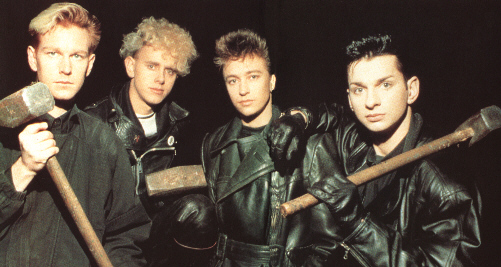
Photo of the group by unknown photographer. Reproduced without permission
ARTICLE
MODES TO FREEDOM
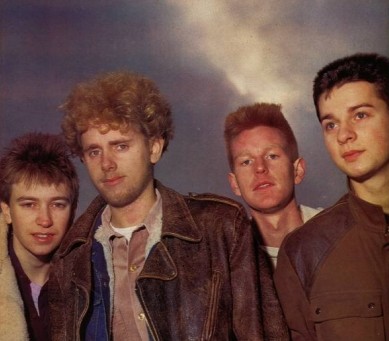
by Betty Page
Record Mirror, 22nd January 1983
_____
A yellow plastic watering can rests idly on the floor, having just recovered from a bashing the previous night in the name of ‘percussive effects’. Worn leopardskin cushions are scattered on an equally worn, but homely, settee. All it needs is the rubber plant to make it as cosy as mum’s sitting room.
The fact that it is also the legendary Blackwing recording studio makes no odds, for it may as well be home for Depeche Mode, who’ve again been ensconced within its walls since Xmas with mentor Dan Miller and smiling engineer Eric, perfecting their first single for four months, a new M Gore meisterwerk.
Martin, hitherto known as the one that sits in the corner during interviews saying nothing while Dave and Andy mouth off, had been ordered by the latter duo to conduct the initial stages of the interview alone to avoid the inevitable inter-band contradictions. Grateful for the chance to grill this most private of songsmiths, we settle down and kick off with a bit of news.
Martin: "Things are a bit different now ’cos Alan’s now a full member of the band and he’s actually playing on the new single, and the B-side is co-written by him and me."
Is this a recent decision?
"Not really, but it only came into effect recently. We planned to take him on full-time after the album, which we wanted to finish on our own otherwise people would have said we couldn’t carry on on our own."
Alan Wilder is now a la Mode, he’ll be bringing his own style and influence along in yet another subtle change to Dep’s melodic delights. It may help them face another year under scrutiny with renewed vigour after a post-novelty period of intense critical flak. But they’ve always expected that, says Mart.
"Things have been going pretty badly for us press-wise recently – it had to come. It’s no surprise, just a bit annoying, especially when there’s a lot of people who used to like you and for some reason they suddenly don’t. Before, you couldn’t do anything wrong, now you can’t do one thing right. You’d think there’d be a couple of ideas they might quite like!"
Master Gore would like to see the critical balance redressed with their soon-come single, appropriately entitled "Get The Balance Right". Martin: "I think it’s a lot harder, more powerful and more direct. It’s quite moody, too. What I’d like to do is diversify so that we’ve got loads of different fields where we’re not just restricted to one type of music. It’s nice to be able to work it however you feel at the time. I think our new material’s going to be more to the point, about more general topics that everyone can relate to rather than having more personal lyrics."
The reflective, heart-searching quality of Martin’s lyrics have always been the subject of much attempted analysis, and he feels he should explain his dislike of discussing them in detail.
"It’s up to people to make of them what they want. A lot of people try and make me explain what every line means, but it takes away any sort of mystique. It might as well be a book or an essay."
Is he optimistic about Depeche’s chances of survival over the coming cut-throat pop year?
"I’m optimistic about our material and the way we’re going to progress and get stronger, but whether the material will sell as well is hard to say. I don’t think we’ve ever been optimistic about it, we always worry. I think we always tend to underestimate ourselves."
Surely that’s better than being braggarts?
"In some ways, but… to the public we come over in interviews as being negative and pessimistic and I think that rubs off on people. When you read something like a Duran Duran interview they’re full of optimism, but to me they come across as being big-headed and I don’t like that."
Depeche really do worry about how people see them (see Dave’s comments later…) and it’s not hard to see how their easy-going, modest manner can be misinterpreted. How does Martin reckon they’re viewed?
"Mainly just… simple minded. We’re rarely taken very seriously, especially by the press and that’s all you hear from apart from fans. We know we don’t believe what the press say, but it’s difficult to confront someone in the street and say ‘what do you think of us?’ Perhaps we should do a survey or something!"
With visions of Daily Star-type opinion polls and ‘real men don’t like Dep Mod’ headlines racing through my brain, Mart retired to the control room to summon the remaining ‘fluent speakers’ muttering about how he "felt like Martin Fry". Having thus ensured the Quiet One had his belated say, Dave, Alan and Andy let their tongues go walkies.
Andy discusses strategy: "We wanna record a new album, get that out as soon as possible, then we can be in a position where we can release singles off that album rather than vice versa. Because of that the last album was undersold and underrated. But then we’ve found people who didn’t like us before do now. I think it appealed to other people."
Dave pitches in, defensively: "We feel our records have improved and progressed in a big way, though. Think of the differences between the new track and ‘Dreaming Of Me’, which was so simple. We’ve come so far in production, we’ve really learned a lot. The same goes with ‘Broken Frame’ and the first album – it was quite a challenge to release that, it also made a lot of journalists listen a bit more and think there’s more to them than just a pop band."
The quartet, who still manage themselves, are ever-aware of the pressures to time everything to perfection and how success (ongoing dept) is based on how your last single did. They’re relying now on a song with ‘real substance’ and a beefed up bottom end (!). But they wouldn’t mind having a visual profile a notch or two higher.
The Deps, however, are resigned to the fact that you can’t look cool when you’ve got a big grin on your face, so they’ll carry on laughing at each other.
Andy: "Some groups are trained to do sickly grins an’ that…"
Dave: "But ours just come out natural!"
The boys can’t help it...
Reprinted WITHOUT PERMISSION for non-profit use only. Photo of the group by Adrian Boot. Reproduced without permission.
SINGLE REVIEWS
GET THE BALANCE RIGHT - released January 31, 1983
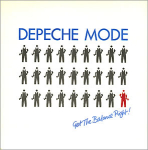
"I have often wondered why God bothered with Depeche Mode."
John Gill
Time Out, 11th February, 1983
"Depeche seem to have fallen from grace with the critical cognoscenti, but this is exactly the sort of single they do better than anyone else."
Johnny Waller
Sounds, 5th February, 1983
"Sardonic humour amid the Basildon bop. Maybe not the most instant record that the Mode have ever dispatched but one that's rewarding enough in the synth-riff department to ensure chart success and fascinating enough structurally to keep it around longer than most."
Fred Dellar
Smash Hits, 3rd February, 1983Reprinted WITHOUT PERMISSION for non-profit use only.
ARTICLE
HANGING IN THE BALANCE

by Mat Snow
New Musical Express, 26th March 1983
_____
Depeche Mode are out to prove they are more than the abandoned puppets of Yazoo's Vince Clarke. Have they got the new balance right?
"DEPECHE MODE are the fast way forward to the future," concluded Lynn Hanna a year ago.
The tape has wound on 12 months and finds the band with their fourth consecutive hit single since Vince Clarke left, a second successful LP under their belts, and growing appreciation in Europe and America.
But in 1982 Vince Clarke’s new project, Yazoo, had the higher profile, leading many people to dismiss Depeche Mode as the abandoned puppets of an eccentric electro-pop genius.
"Our success last year was overshadowed by Yazoo’s success," admits Andy Fletcher. "A lot of people really think we resent Yazoo. A lot of people in the general public still think he was the brains behind the group."
Andy is sipping milk in the restaurant of Frankfurt’s curiously named Hotel Splendid. Depeche Mode have just played a one-off concert at the Kongresshalle, neatly tying in with the musical instrument fair being held at Frankfurt’s massive exhibition centre that week. Songsmith Martin Gore and Daniel Miller, supremo of their record label Mute, have been sampling the wares.
In appearance Andy is part Shed boot-boy, part Okie farm-hand. Taller than the rest of the group, he is their semi-official voice. Martin, clad in Russian tank-driver black leather cap and jerkin, is notoriously shy and self-effacing, his air of fragile vulnerability enhanced by a halo of infant’s curls. By contrast singer Dave Gahan is a bit of a lad. Pushy, extrovert and exuberantly witty, Dave is Depeche Mode’s master of ceremonies, both on and off stage.
At 23 the oldest in the band, Alan Wilder has only recently become a permanent member. A veteran of various North London combos, Al joined when Vince left.
"They advertised in Melody Maker and I answered the advert," he explains. "It said, Name band, synthesiser, must be under 21. So I lied, I was actually 22."
Al is still slightly aloof from the rest of the group, debarred from joining in wholeheartedly by his different background. But with all the zeal of the converted, he is their most trenchant champion.
"Somebody in their position doesn’t get somebody new in the first week who might turn out to be a complete arsehole. So I was touring and doing TV but wasn’t actually recording with them until this new single now."
"GET THE Balance Right" is the toughest 45 Depeche Mode have so far released. It deviates even further than its predecessor, "Leave In Silence", from the sunny, sparkling Mode singles of public expectations. But, as stylistic innovators from the beginning, Depeche Mode are not about to cease challenging their audience now.
Al elaborates: "Luckily we’re in the position where we know we’re going to get a certain amount of radio play just on the strength of reputation, which means that you can take slightly more of a risk than maybe a band putting out their first single."
"When we released ‘Leave In Silence’ it was a gamble," Dave recalls. "It didn’t get nearly as much airplay as our past records had got. It didn’t go as well, but the fact was it wasn’t played as much. The radio didn’t see it as a single; they saw it as more of an album track."
How concerned are Depeche Mode with commercial success?
Says Al: "We obviously want to become established enough, if we want, to go out on a limb and vary our approach."
"With the music industry being so fickle, you’ve got to keep up there all the time," Andy stresses. "Or if not, you’re forgotten in a moment."
And success in America?
"We’ve done all right, " comments Dave. "’Just Can’t Get Enough’ was very big in the discos and clubs over there."
"You can have a fluke hit in America," expounds Dave. "Our new single may become a hit in America but only through a fluke. All the English bands that are in the charts at the moment, none of them have followed it up with a second single. And that’s because none of them have gone over and toured for six months apart from A Flock Of Seagulls."
Andy: "To be honest though, America isn’t the end, isn’t our aim at all. I trust I speak for the whole band. Germany for us is definitely more important at the moment. Germany is the market to break."
"It’s an exciting market as well," chimes in Dave. "We enjoy it over here, actually doing gigs over here. You can see something’s happening, that we’re building. We can see ourselves getting bigger every time we come over here and play."
THE SUCCESS of tonight’s gig justifies their confidence. Despite the unpromising atmosphere of the vast, overlit, functional Kongresshalle itself, a large audience of post-pubescents are drawn into delighted communion with Depeche Mode’s symphonies for kids (of any age).
Their show is a careful mixture of spectacle and intimacy. Al and Martin appear first onstage, being gradually enveloped in smoke as they brew up a swirling instrumental overture. Then Andy walks on, as amiable and unstuffy as they come. Belying his backstage nerves, he casually switches on the backing tape-machines sitting centre-stage as he strolls over to his synthesisers.
Just by that casual press of a button he sums up Depeche Mode’s appeal; the technology of their music-making is instantly demythologised. You don’t have to be a genius or rich or good-looking to stand a chance. Just like that other quartet of boys-next-door twenty years ago, Depeche Mode bridge the gap between performer and audience by showing the potential for magic in the most familiar, accessible things.
BEFORE HE goes onstage, Dave makes final adjustments to his appearance in the dressing-room mirror:
" 'There’s gonna be a borstal breakout, there’s gonna be a borstal breakout!' "he chants. "Those were the days of real music."
Dave doesn’t seem the milk and biscuit type.
"He was quite a lively youngster, by all accounts," insinuates Al.
"Dave has a different background from us," elaborates Andy. "Done everything before you’re 17. Like clubber, Studio 21… We never went nightclubbing."
"When we were doing our homework," laughs Martin.
"When Dave was going up to London and that, I was going to church," continues Andy. "I went to church seven nights a week. So did Vince. Vince was really bad, if you think I was. Vince was a real Bible-basher… There was all this rumour going around about churchgoing choirboys. I was never in the choir."
But the band’s early image was so sweet and angelic…
"That’s the way we were though," remonstrates Andy. "We never tried to portray ourselves. We bought loads of jumpers out of Marks And Sparks. That’s the way we are. We’re not wimps. The bands that said we’re wimps… Bow Wow Wow – I’d take them on any day!" he guffaws.
WITH LITTLE free time, not enough money and even less inclination to leave Basildon, Martin, Andy and Dave still live at home. How do their parents feel?
"To tell you the truth, they remain totally unaffected," confides Andy. "It’s as if you were going to the office every day. I think they don’t really realise the extent. They see us coming home on a day we’ve been recording. They see us on telly, but they just accept it as normal. I don’t know why… everyone’s doing it!"
And your old mates?
"We never had any trouble. Obviously some people jeer and this. It’s maddening when they sing Yazoo songs at us. You just have to keep going, through the troubles, the trials."
Andy heaves with mock sobbing, appropriately accompanied by the lachrymose strains of ‘Moon River’ on the hotel’s muzak system. "All we wanted to do was make nice music!"
Vince and Yazoo are never far from the surface.
"A lot of the reasons we made it was because of Vince," explains Andy. "He was on the dole. He was pushing and pushing. You’ve got to give him credit – he was very ambitious. And without him we wouldn’t have made it because we’re not ambitious people. We're lazy people."
Vince’s quitting in the midst of band commitments caused a crisis.
"He didn’t leave us totally in the lurch," Martin explains. "He actually told us that he was leaving around the end of October (1981), but he carried on playing with us right up until Christmas. After that, all we had scheduled was an American tour, and that was quite tight because we had to get Al in and rehearse in about a week."
And Martin, who had hitherto penned only two numbers in the band’s live and recorded repertoire – ‘Big Muff’ and ‘Tora! Tora! Tora!’ – found himself the principal songwriter.
"Four or five months before Vince announced to us he was leaving, we sensed it, so we tried to build up a few songs as a sort of cushion. At that time anyway I was a bit wary about putting songs forward because we did feel it would be better to save them."
An admirer of Jonathan Richman and Ron Mael, Martin writes very different songs to Vince’s fiction romances. ‘A Broken Frame’ is a beautifully crafted compendium of sighs for lost innocence and observations of the worm in the bud of human affairs. ‘Get The Balance Right’ develops further in the same direction. Richly multilayered in texture and melody, its rhythm steamhammers home a bleak message of ironically intended realism. What’s up, Mart?
"It’s difficult to pinpoint what it is. You get older and you see more at the same time. Whether it’s just actually seeing more or seeing it through different eyes… I tend personally to get disillusioned by a lot of things. Things that used to seem great don’t seem so great anymore. Perhaps I’m just a very pessimistic person."
WE ARRIVED back at Heathrow Airport on chart day, and everyone’s anxiety about the fate of ‘Balance’ with the fickle public was palpable. Whilst waiting for our baggage ‘Uncle’ Dan Miller made a quick call to Mute HQ… Number 32, the highest position Mode have ever entered the British chart!
So, despite the predictions of downfall, Depeche Mode are still ahead of the game. Fast forward once more to the future and they won’t be just filling the dance floor but hearts and minds as well. See you there.
Reprinted WITHOUT PERMISSION for non-profit use only. Photo by Peter Anderson. Reproduced without permission.
SINGLE REVIEWS
EVERYTHING COUNTS - released August 11, 1983
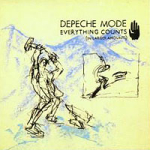
"And the band played on ... whether the members of Depeche Mode are actually dead or alive is a question that has baffled the medical profession for years. Stupefyingly predictable."
Gary Bushell
Sounds, 16th July, 1983
"Basildon’s very own Peter Pans are in the process of growing up. Here they take their first step outside the car park of innocence and are shocked to find themselves in a big bad world populated by wolves.
As this is pop rather than rock, the Modes sound more injured than angry over their discovery that "it’s a competitive world".
This is their strongest melody in a long while and a compelling picture of business Britain that’s not a million miles away from that of the Bunnymen’s ‘Never Stop’."
Mark Cooper
No 1, 16th July, 1983Reprinted WITHOUT PERMISSION for non-profit use only.
"A bit heavy on the lyrics - all about contracts and people ripping you off - but a nugget nonetheless. While most synthesiser bands are beginning to sound tedious, D.M. still manage to retain a freshness and a subtlety which makes them so continually appealing."
Unknown reviewer
Smash Hits, 14th July, 1983Reprinted WITHOUT PERMISSION for non-profit use only.
ARTICLE
NEW LIFE 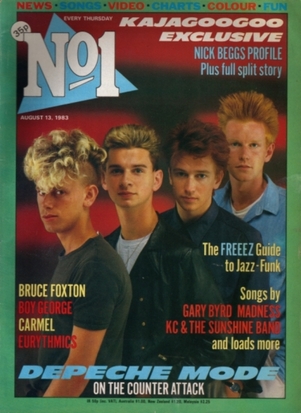
by Paul Bursche
No.1, 13th August 1983
_____
Depeche Mode have come a long way from their first hit 'New Life'. They're not the fresh-faced innocents they used to be. They're still making sweet pop but now the songs are about the nasty music biz. Paul Bursche met the boys from Basildon and copped a quick lesson on the meaning of life.
You could forgive the four Depeches if they were a bit tetchy and bad-tempered these days.
Despite their recent singles showing a growing maturity, the band are still looked upon as no more than teen idols by a lot of people.
Luckily their good humour has remained intact, but Andy Fletcher just can't understand it.
"As soon as people hear the name they start to think that here's another sweet pop single. I hope that people will give the new album a proper listen. They might be surprised."
The new album is called 'Construction Time Again' and that's a good description. It focuses on a band building on past successes while still looking for new avenues to explore, far from their early sugary days.
Depeche Mode emerged from Basildon in 1980 with a string of hits including 'New Life' and 'Just Can't Get Enough'.
They were the first band to perfect the sweet sound of synth, guided by songwriter Vince Clarke.
But when Vince left to form Yazoo he took all the acclaim with him and suddenly Depeche were yesterday's thing - despite Martin Gore taking the mantle of songwriter and giving us great songs like 'See You'.
Their new LP still has all those tinkling synth lines, but they've tried other instruments as well.
"There's a track called 'Pipeline' on the album," says Alan Wilder. "It's got a lot of strange percussion in it. What we did was to just go out and start banging on anything we could find. Dave's vocal was even recorded outdoors." [Actually, it was Martin who took the vocal on this track - BB.]
The album runs parallel with the lads themselves growing up. It was recorded away from their normal nestling ground of Blackwing Studios, in London and Germany.
The boys, similarly, have broadened out.
"All the travelling we've done has certainly helped," admits Dave Gahan.
But Andy doesn't see growing up in such a definite light.
"I still feel the same as I did when I was 16," he says.
"Obviously, though, my friends have told me that I've changed in loads of ways. The same must go for the band. We've gradually evolved into a more mature group."
The reaction in some of the places they have visited has certainly changed ideas about the group. For instance, in Germany, the group are regarded as very hip.
"It's very odd," says Dave. "When we play German cities the word gets around that we're in town as if we're some big hip band. I'm pleased. It shows that our music does have a wider appeal."
All this touring, however, doesn't seem to have led to the sort of on-the-road antics that normally have groups adorning the front covers of the Sun with tales of orgies and debauchery.
Alan sneers. "I think that a lot of groups need to do that for the publicity. It's a very old-fashioned rock thing."
"I'm not saying that we don't get up to these things," adds dashing Dave. "It's just that if we do they don't get out. I mean, most of these groups work for really large companies and there's always someone who will tell the press. Our company is so small that we know it wouldn't leak out."
They do seem to steer away from the wild life, do Depeche. Their last single told us to 'Get The Balance Right', which meant no wild excesses - an attitude totally contrary to the traditional view of rock as rebellion.
Their new single 'Everything Counts' is more an offensive, however. It gets at all the big deals and falseness.
It focuses on the two-faced attitudes that abound in [the] industry. And not only the music biz, but anywhere where money is involved. Gore states that behind all the deals and motives lies pure selfishness.
"I'm not so personally bitter," says Martin. "I lead a good enough life. It's just things that I've noticed."
"We're in a good position to be observers," says Alan. "We're always meeting groups and hearing about dodgy deals. I suppose we're lucky because we're in a position where it doesn't apply to us."
This is because Depeche Mode are still an independent group on the small Mute label.
"We've had our arguments with Daniel Miller (the head of Mute)," says Dave, "but we've been in it together from the very start, so we're a good team."
This closeness within the company has always meant that Mute would support Depeche Mode, so they don't have to be too worried about the whole affair of hits.
They can get on with doing their own thing. This includes the forthcoming album and a British tour in September.
The boys have grown up and are now in a position of far greater control. But they're not prepared to ditch the teenage fans who have put them there. Some groups, like Japan, may have done this but Martin has other ideas.
"Without the fans we wouldn't be in a position to try things. And while our music does explore a bit more it's still commercial."
Enjoy the album.
Reprinted WITHOUT PERMISSION for non-profit use only.
See the original interview here

Accompanying mini-poster
ALBUM REVIEWS
CONSTRUCTION TIME AGAIN (LP) - released August 1983
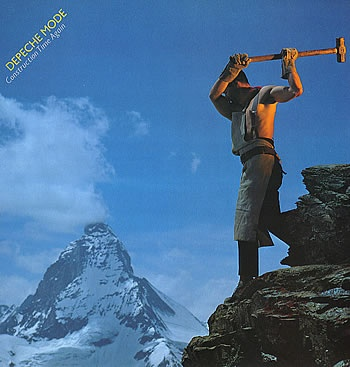
Uplifting New Buildings
"Lots of surprises in store/This isn't a party/It's a whole lot more," sings Dave Gahan in 'More Than A Party'. It's a song from 'Construction Time Again', Depeche Mode's third album, easily their best yet.
First impressions: the sleeve of last year's 'A Broken Frame' portrayed a peasant woman wielding a sickle over a dauntingly endless steppe of wheat. No big deal, laughed the Basildon boys at the time; it's was just a pretty picture. Come the next witch-trials, they won't be able to offer any such flimsy excuse for 'Construction Time Again'. Again beautifuly photographed by Brian Griffin, a hero of socialist realism stands poised atop a mountain crag, his hammer raised aloft. And you thought British Leyland had problems: "There was a time/When all on my mind was love/Now I find/That most of the time/Love's not enough/In itself" (Love, In Itself).
You'll find no 'Meaning Of Love', 'See You', or even 'Leave In Silence' here; 'Construction Time Again' avoids the personal. It's on it's soapbox, thinking aloud about the world and it's woes with a voice in equal measure acute, uncertain, naive, and gauche. But there's an honesty, almost a shyness, that convinces you that Depeche Mode aren't just another bunch of two-bit pop stars sounding off the party line to garner some intellectual credibility.
Indeed, in today's escapism, a right-on attitude stands low in the list of chart cert ingredients. And so it must be to Mode's credit that they have abandoned the evergreen moon-June formula which has brought them thus far so enjoyably in favour of a thought-provoking breach of teen-dream etiquette. Who would have thought it? Would ABC take such a risk? Would Roxy? Would Bowie?
To me 'Everything Counts' is Mode's best ever single, and undeniably one of their biggest hits. Yet the nation didn't clutch it to its bosom to endorse its analysis of how capitalism can only thrive on the most selfish motives. It sold because it combines edgy and poignant melodies held in thrilling tension; a tough, urgent dancebeat; and a gleamingly modern sound with an element of quirkiness to mark it out in the crowd. And the same goes for every other track on the album.
Alan Wilder's 'Two Minute Warning', one of a pair of his compositions here, is a dreamlike anticipation of the Big One, set in a haunting melody whose transition from verse to chorus explodes in one of those breathtakingly uplifting moments so beautiful because so rarely heard.
'And Then ...' is similiarly inspired. An Oriental percussion motif, like Chinese water torture or ringing hammer blows (note the symbolism) introduces the song. Variations of this idea, evoking the two linked concepts of the Communist East and tireless industry ('Construction Time Again' - geddit?), thread through the whole LP.
'And Then ...' continues with a contrapuntal synth-bass line which flexes and drives the song onwards through the verses of weary despair, then upwards into a soaring chorus of shimmeringly spacious rapture reminiscent of The Police at their best. At such moments you would believe Mode can fly.
What else? Dave Gahan's voice resounds with unsuspected strength and subtlety, and Martin Gore must now be regarded amongst our premier songwriters. The sounds and textures Mode's Gore, Fletcher and Wilder coax from their synthesisers and associated hardware are so rich and various that Messrs Heaven, League and Clarke appear by comparison somewhat primitive. European tonmeisters like Kraftwerk and Yello's Blank had better look to their sequencers.
Like one of '83's other great LPs, Soft Cell's 'Art Of Falling Apart', 'Construction Time Again' demonstrates how obsolete the term "electro-pop" has now become. Depeche Mode have made a bold and lovely pop record. Simple as that."
Mat Snow
New Musical Express, 27th August, 1983
Reprinted WITHOUT PERMISSION for non-profit use only.
See the original review here
Riveting Stuff
"Anyone who thinks they know all there is to know about the Modes from their hit singles needs this album.
With the exception of Alan Wilder’s "The Landscape" [sic] and the brilliant "Two Minute Warning", all songs are written by a passionately caring Martin Gore.
His protest songs are serious and sharply observed, but they retain that distinctive ear for a commercial melody.
Obviously lovingly made, the Modes have lots of fun on this LP, bashing away on anything that makes an unusual sound, notably so on the rhythmic "Pipeline".
It’s impossible to pick out tracks, as the whole effect is sharp, tight, smooth and absolutely riveting! Buy it." 5/5
Anne Lambert
No 1, 27th August, 1983
Reprinted WITHOUT PERMISSION for non-profit use only.
See the original review here
"Basildon boys who sing pretty electropop songs about love. Right? Wrong. Now they've grown up, love is not enough and attention is turned outwards to the world (and all its problems). Russian, European and Oriental influences are all apparent in the music. The songs are still electronically based, but the brilliantly melodic and bouncy edge is contrasted by a brooding "Tin Drum"-type sparseness. A brave departure." (7 out of 10)
Peter Martin
Smash Hits, 1st-14th September, 1983
Reprinted WITHOUT PERMISSION for non-profit use only.
The group talk about mixing the album in Berlin here
